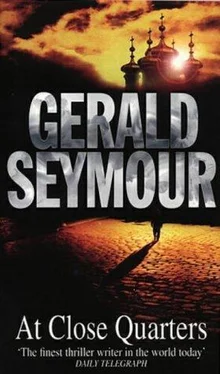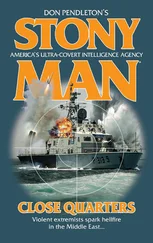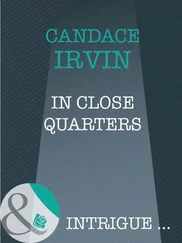Gerald Seymour - At Close Quarters
Здесь есть возможность читать онлайн «Gerald Seymour - At Close Quarters» весь текст электронной книги совершенно бесплатно (целиком полную версию без сокращений). В некоторых случаях можно слушать аудио, скачать через торрент в формате fb2 и присутствует краткое содержание. Жанр: Триллер, на английском языке. Описание произведения, (предисловие) а так же отзывы посетителей доступны на портале библиотеки ЛибКат.
- Название:At Close Quarters
- Автор:
- Жанр:
- Год:неизвестен
- ISBN:нет данных
- Рейтинг книги:3 / 5. Голосов: 1
-
Избранное:Добавить в избранное
- Отзывы:
-
Ваша оценка:
- 60
- 1
- 2
- 3
- 4
- 5
At Close Quarters: краткое содержание, описание и аннотация
Предлагаем к чтению аннотацию, описание, краткое содержание или предисловие (зависит от того, что написал сам автор книги «At Close Quarters»). Если вы не нашли необходимую информацию о книге — напишите в комментариях, мы постараемся отыскать её.
At Close Quarters — читать онлайн бесплатно полную книгу (весь текст) целиком
Ниже представлен текст книги, разбитый по страницам. Система сохранения места последней прочитанной страницы, позволяет с удобством читать онлайн бесплатно книгу «At Close Quarters», без необходимости каждый раз заново искать на чём Вы остановились. Поставьте закладку, и сможете в любой момент перейти на страницу, на которой закончили чтение.
Интервал:
Закладка:
"What do you propose to do with me?"
"You will be confined in the camp area, where you can do no further damage."
"And afterwards?"
"Afterwards you will live with your shame."
"What have I done?"
"You have confirmed to the Syrians that there is a mission. You have told the Syrians of British interest in that mission. If the Syrians can make an equation between the mission and the killings at Yalta then they will know the target. They will remove the target from view, and also they will ambush your man and my man.
If the Syrians make the equation then the mission is lost, our men are lost."
Martins murmured, "God, I am so sorry."
"Pray that the Syrians are as idiotic as you are.
Myself, I do not think it likely."
There was the scratching of Major Zvi Dan's chair as he stood up. The door opened. The two men led Martins away to confinement, his head sagging.
They had studied the map, they had covered the trail they would use and the position of the rally points.
"How long tonight?"
"Eight hours."
"And then the camp?"
"In eight hours we should be above the camp, youngster."
"How are the eyes?"
"Just stick to worrying about yourself, whether you'll recognise the target. I don't need your worry."
"You should come back with me, Mr Crane, afterwards, back to England."
"You talk too much, Holt."
"I've done nothing in my life. If I'd done everything you've done in your life there's nothing I'd want more than to go away, bury myself, live on the moor, walk beside the rivers, know the peace of where I live. I haven't earned that peace, Mr Crane. You have."
"Is it that good there?" Crane asked.
"You could walk free. The animals are free, the people are free, the light and the air are wonderful. No rifles, no fighter bombers, no bloody minefields, you deserve that peace, Mr Crane. Will you think about it?"
"Might just."
They had the Bergens high on their backs. Holt let Crane get fifteen yards ahead, then moved out after him.
The start of the last night march.
As a matter of routine, Major Said Hazan received in the early evening a report covering the previous 24-hour period as prepared by army headquarters at Chtaura.
He read every detail of the report, as he always did. Far down in the list he read that a patrol in position west and south of the Beqa'a village of Aitanit had fired flares in response to unidentified movement further west of them. The report stated that a follow-up search in daylight centred on an animal track, but had failed to provide evidence that would justify further sweep searches of the area.
The major went to his wall map. He put a red-headed pin into the map over the area of the U N I F I L sector through which it had been reported that an infiltration had been made. He drove in another red-headed pin at the point of the unconfirmed contact with the patrol.
He stood back. He extended a line from the infiltration point to the supposed contact. They were going north, the shortest possible route into the foothills on the west side of the Beqa'a.
In the valley, marked on his map, were the camps of 18 different Syrian army concentrations, and in addition the camps of the Popular Front, the Democratic Popular Front, the Abu Moussa faction, the Sai'iqa group, the Popular Struggle Front. There were also the villages used by the Hezbollah, and the houses occupied by the men of Islamic Jihad. There were the communities that played host to the revolutionary guards who had sat in the Beqa'a unmoving after their despatch from Iran. In all, indicated on his map, there were 43 locations that could prove of interest to an infiltration team of the enemy.
At the moment he was helpless. But he was a man of patience.
In the camp the cook's fire guttered. The cook thought that in the morning he would use the last of his wood to prepare the breakfast, that he would spend the morning scavenging for more.
17
It was a crisp, sharp night.
The heat of the day had dissipated into the rocky slopes. In the night there was a fresh wind that caught at the sweat that ran in rivers on the throat and chest of young Holt. The pace of the night march was no greater and no less than it had been on the two previous nights, but he sweated, as he thought, like a pig. The pace of the night march remained, give or take a few yards or a few minutes, at one mile in one hour. The going should have been easier because each man was lighter from the consumption of water, close to a half of the water had been used, but still he sweated in the cool of the night march. He felt as if, along with the perspiration, the strength oozed from his body. When they reached there, when they were on the high ground overlooking the tent camp, Holt thought he would be reduced to a wrung out rag. There were no more kicked stones, there were no cracked twig branches, there was no scuffling through sun crisped leaves. Each step was concentration, each short checked stride was care.
Crane was a shape ahead of him. It was a blurred shape that only came to life at the rally points when Crane stopped and squatted and Holt reached him to slump beside him. They did not speak at the first rally points of the night. They sat and allowed their leg muscles to soften and Holt let his mind wander from the concentration and care and exhaustion of the march.
There were no words, no whispers, because Holt did not have to be told that they were now deep behind the lines. It was all in his head, it had all been told him and was remembered. They were moving north on the hill slopes between the valley floor and the peaks of the Jabal al Barouk. On the Jabal al Barouk was a state-of-the-art Soviet-built complex of radar dishes and antennae manned by the Syrian air force. Sensitive country. The dishes and antennae were protected from surprise attack. Scattered round the air defence and signals listening equipment would be, according to Crane's bible text, the GS-13 divisional level surveillance radars operating from 50 kW power packs and with a twelve kilometre competence to detect personnel and a 25 kilometre range for seeing the movement of vehicles.
Moving on the slopes above the valley and below the installations on the summit of Jabal al Barouk, Crane led Holt in darted spurts as a sailor would tack before the wind. They changed the angle of their progress every fifty, sixty, yards, as if by that manoeuvre Crane believed he could throw the attention of a drowsing ground surveillance radar screen operator. Of course, it would have been faster to have moved lower down onto the gentler slopes of the valley sides, but Crane had explained at the last lying up position that further behind the Syrian positions the risk increased of blundering into mine fields, of drifting into the wadis where the anti-personnel mines would be set around the heavy pressure anti-armour concentrations. That night, on the marches between the rally points, Holt learned much.
He learned of the methods of evasion from the dishes of ground surveillance radar, and of the way in which the cover of the terrain could be used to prevent discovery of their progress at the hands of thermal imagery equipment. He learned of the hazard of a low flying aircraft, droning above them without even navigation lights, when Crane had plotted the aircraft's path and scuttled to get clear of its flight line in case it carried infra-red targetting screens.
They moved on. Holt could not assess the threat. He could only remember the warnings that had been given him in a gravel whisper before they had left the lying up position. They lurched from rally point to rally point. The exhaustion spread through Holt's legs, through his back, through his shoulders. His recovery in the short breaks at the rally points became steadily less restorative.
Читать дальшеИнтервал:
Закладка:
Похожие книги на «At Close Quarters»
Представляем Вашему вниманию похожие книги на «At Close Quarters» списком для выбора. Мы отобрали схожую по названию и смыслу литературу в надежде предоставить читателям больше вариантов отыскать новые, интересные, ещё непрочитанные произведения.
Обсуждение, отзывы о книге «At Close Quarters» и просто собственные мнения читателей. Оставьте ваши комментарии, напишите, что Вы думаете о произведении, его смысле или главных героях. Укажите что конкретно понравилось, а что нет, и почему Вы так считаете.












